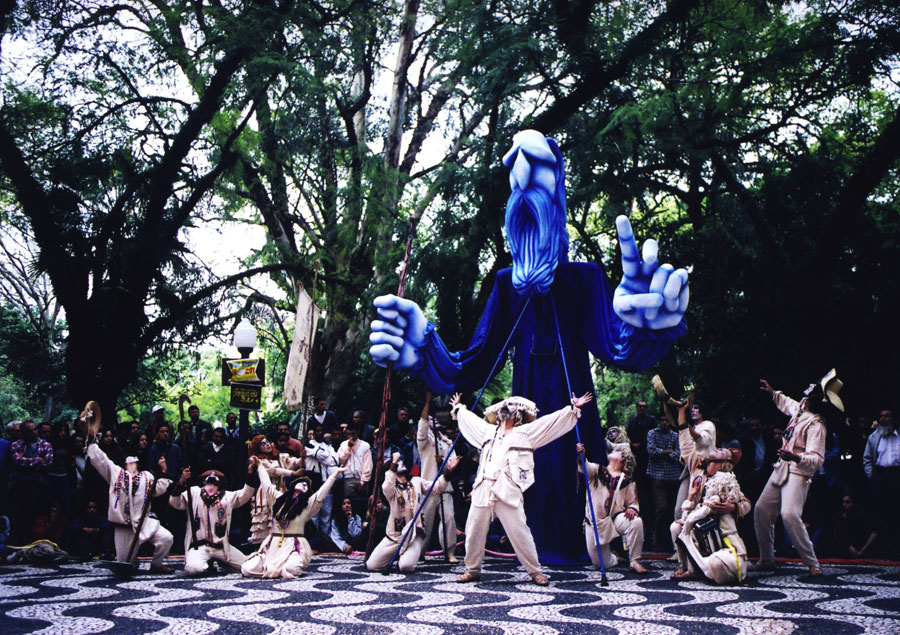New deadline (Sept 15th) for our special issue: "Theater Groups Yesterday and Today: Acts and Potency of Transformation of Art and Society"
Deadline: September 15th, 2024
Coeditors: Ricardo Gomes, Priscilla Duarte, Lídia Olinto
The Performing Arts are collective arts in every latitude, in all historical periods. The scene itself can be defined as an encounter of two collectives, that of the artists, whose cohesion and organization revolves around the scenic action, and that of the spectators, which is temporary, casual, but is representative of a larger community, that encompasses it. Due to this immanent collective character, the Performing Arts can be - and have been throughout history - laboratories of human relationships, thus having ethical, aesthetic, political, psychological and existential developments.
In the second half of the last century, however, a particular type of theatrical collective emerged: The Theater Group. It is rooted in the theater-labs of the first half of the 20th century, but its forms of organization, its political action and its horizon of aesthetic references (in which the multiplicity and singularity of the different groups has weight) are deeply connected to the counter-culture movement and to the revolution of values of the 1960s-1970s. In the Theater Group there is a desire to recreate, on new foundations, the entire spectrum of human relationships: from power relations to affective relationships; from artistic creations to the relationship with the market; from the relationship with the scenic space to the relationship with the city etc. Thus, Theater Group is quite different from a theater company, a political or cultural association, and even a family; it shares, however, many characteristics with these forms of social organization, thus living immersed in contradictions inherent to revolutionaries, who fight to overcome the past but are not able to fully free themselves from it.
The importance and the potency of the Theater Groups in Latin America and Brazil can be measured by the virulence and the violence with which they were persecuted and repressed by the totalitarian governments which were endemic in the postcolonial Global South. The fight for survival and the search for effectiveness in society led them to create webs of artistic, social, cultural and political relationships. These movements had, throughout history, different denominations. We highlight only three of them, which obviously do not exhaust the subject, but are significant of certain striking characteristics of these movements. The first and most pervasive is GROUP THEATER - if on one hand it is a tautological designation, on the other it emphasizes the power of the collective, of the community, as an entity above the individuals (even though historically many groups have been organized around a charismatic figure and this person’s conception of art and life). The second is INDEPENDENT THEATER - a special Latin-American designation with a decolonial orientation, that has its roots in the creation of the Teatro Del Pueblo (“Theater of the People” in a free translation) by Leónidas Barletta, in 1930, in Argentina. Finally, we highlight the THIRD THEATER, a concept created in 1976 by Eugenio Barba with the purpose of defining common characteristics between European and Latin-American groups who lived in the margins of the culture market and identified themselves neither with traditional theater nor with avant-garde theater.

Show "A saga de Canudos" (2000) from Tribo de Atuadores 'Ói Nóis Aqui Traveiz' (RS). Photo by Claudio Etges.
More than fifty years after the students’ agitation in 1968, the potency of counterculture seems to have diminished. Although undoubtedly a lot has changed since then, and these changes in society are indebted to the forces that emerged at that time, it is also evident that the wave provoked by the desire for radical transformation that that youth expressed crashed against the rocks of reality and ebbed into contradictions it carried within itself. The present moment is marked by disillusion, by mental and physical sickness, by the feeling of impotence facing the world's machine that crushes dreams, turning them into commodities. But the present moment can also be the moment to say NO to so many forms of oppression cultivated within us for so long, if we are able to organize ourselves and fight so that our voices are not reduced to artificially compartmentalized and powerless discourses.
The majority of Theater Groups that were born in the 1960s-1970s - and many of their members - no longer exist. Some persist, maybe less in the margins or independent than they once were, maybe still guided by the same ideals, certainly adapted to the new realities. Other groups have emerged and emerge sill every day with their own designations and forms of organization. If History is a means of searching in the past answers for the future, then we can ask: What does Theater Group have to tell? Can it still be an effective means to act against the world's machine in contemporaneity?
Our Special Issue “Theater Groups Yesterday and Today: Acts and Potency of Transformation in Art and Society” aims to raise the aforementioned questions. We welcome papers and reflective accounts from researches, artists and artist-researches on the topic of Group Theater, in its many denominations and inflections, ranging from research on artists, groups and specific movements to broader studies related to this theme pervading the different fields of Art and Humanities.


